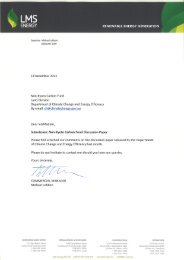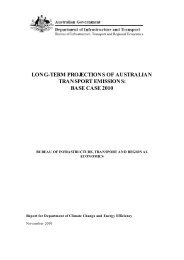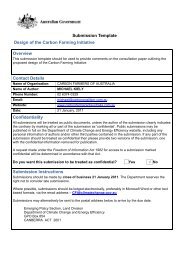Enterprise Agreement 2011-14 - Department of Climate Change
Enterprise Agreement 2011-14 - Department of Climate Change
Enterprise Agreement 2011-14 - Department of Climate Change
Create successful ePaper yourself
Turn your PDF publications into a flip-book with our unique Google optimized e-Paper software.
<strong>Department</strong> <strong>of</strong> <strong>Climate</strong> <strong>Change</strong> and Energy Efficiency – <strong>Enterprise</strong> <strong>Agreement</strong> <strong>2011</strong>-<strong>14</strong><br />
o an employee may reduce their flextime credit (or incur a flextime debit) by taking a<br />
flextime absence, which is an absence from the workplace during standard working<br />
hours requested in advance by the employee and approved by the employee’s<br />
supervisor;<br />
o a flextime absence may be taken in part or full days up to a maximum <strong>of</strong> five (5)<br />
consecutive days;<br />
23.3. APS 1-6 employees (and their equivalents) are eligible to accrue flextime for duty performed<br />
in excess <strong>of</strong> their ordinary hours <strong>of</strong> work (over the four week settlement period), but which<br />
does not attract overtime.<br />
23.4. The relevant manager may require an employee not to work hours in addition to ordinary<br />
hours where there is insufficient work. That is, a manager may require that an employee not<br />
accrue flextime where such accrual cannot be justified by the employee's workload.<br />
23.5. Employees may carry over a maximum <strong>of</strong> one week flex credit at the end <strong>of</strong> the settlement<br />
period.<br />
23.6. Flex credits exceeding one week (37.5 hours for a full time employee) may be cashed out at<br />
ordinary time rates where, due to organisational requirements, the manager cannot<br />
envisage an opportunity for the employee to use these credits in the settlement period.<br />
23.7. Employees may carry over a maximum <strong>of</strong> two days (15 hours) for a full time employee) flex<br />
debit accumulated in any settlement period into the next settlement period.<br />
23.8. Flex balances in accordance with 23.6 and 23.7 will be retained upon movement, either<br />
temporary or permanent, between organisational units.<br />
23.9. In circumstances where the maximum debit is exceeded at the end <strong>of</strong> a settlement period,<br />
the employee will endeavour to reduce the debit to the maximum allowable (or lower) over<br />
the next settlement period. Should this not occur, the amount may be recovered.<br />
23.10. Where an employee has failed to comply with the provisions <strong>of</strong> flextime, the Secretary may<br />
remove that employee from flextime for a specified period and the employee will revert to<br />
working the standard ordinary hours. Access to flexible working arrangements will be<br />
restored where the Secretary is satisfied that the employee will maintain satisfactory<br />
attendance patterns.<br />
24. Executive Level employees: time <strong>of</strong>f in lieu (TOIL) and flexible hours<br />
24.1. Executive Level employees have an important role in providing leadership and establishing a<br />
positive culture in order to ensure the <strong>Department</strong> can achieve its outcomes.<br />
24.2. The Secretary will ensure Executive Level staff can access TOIL and that the provisions are<br />
consistently applied across the <strong>Department</strong>. The <strong>Department</strong> does not endorse working<br />
arrangements that require Executive Level employees to work excessive hours over<br />
15






